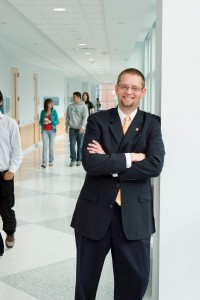 After the jerseys have been washed and the grandstands have been cleared of clutter, a professional sports teams’ work is just beginning. Corporate Social Responsibility (CSR) or a team’s efforts to use its impact for the greater good of its community, is no longer a secondary concern to the product they assemble on the field.
After the jerseys have been washed and the grandstands have been cleared of clutter, a professional sports teams’ work is just beginning. Corporate Social Responsibility (CSR) or a team’s efforts to use its impact for the greater good of its community, is no longer a secondary concern to the product they assemble on the field.
For Dr. R. Aubrey Kent, Associate Professor and chair of the School of Tourism and Hospitality Management, CSR is an integral aspect of a sports team’s contribution to the community.
“CSR is important to a double or triple bottom line that includes social and environmental impacts,” said Kent, whose extensive research into CSR has produced multiple published articles and international presentations. “Sports teams are trying to grow a brand that goes beyond performance by being committed to the community.”
Kent’s work with the Professional Golf Association (PGA) in Florida spurred on his research interest in CSR. The PGA is widely known as one of the most-charitable professional sport leagues and organizations. In 2015, the PGA added 10 non-profit charities to its already lengthy roster. In his research into CSR and sports, Kent said he’s seen other sports leagues and organizations follow in the PGA’s footsteps in adopting a community-centric approach to business management.
Major League Baseball’s Philadelphia Phillies and the National Football League’s Philadelphia Eagles are known for their socially responsible and sustainability work, hosting “Go Green” games each season. But, as Kent found, the Phillies are less known for their efforts at reducing childhood hunger, or the Eagles for their work providing optometry services to children from low-income families. The fact that these ventures remain relatively unknown is what differentiates CSR from more-familiar marketing campaigns, Kent explained.
“Every single team has separate charitable organizations with very little publicity or fanfare,” Kent said.
As teams’ efforts maintain a low profile and provide the team with little to no financial benefit, Kent said identifying a team’s motivation for giving back can be difficult. Aside from the most-obvious altruistic intentions, Kent said other reasons include a team’s eagerness to satisfy intrinsic value systems and its hope that such values could appeal to more conscientious fans.
“The motivations have to be ingrained and value-laden because the financial incentives aren’t there,” Kent said. “Today, we care more, as a consumer class, about things that aren’t purely economic.”
Though CSR won’t change consumer opinion too greatly, as fans remain more concerned with performance on the field than corporate responsibility off of it, Kent said consumers have taken notice to team’s or a player’s CSR. Or lack thereof.
“Athletes are held to a higher standard because of the impact they have on youth,” Kent said.
The social impact athletes have as heroes among children can produce positive results in education and anti-drug campaigns, he said. Similar results are seen with negative behavior. When news broke of a 2007 investigation into National Football League player Michael Vick’s involvement in a dog-fighting ring, his team – the Atlanta Falcons – made a considerable donation to local humane shelters and animal societies. Fans reacted negatively, accusing the Falcons of making a reactionary donation.
The difference between a genuine and an insincere response, Kent said, is for teams to find that “sweet spot” between performing their social duties and publicizing their efforts. Kent found that teams are facing a more complex branding system, as they attempt to promote their social values while maneuvering daily amid a conscientious fan base.
“Sports are much more engaging emotionally and there’s an ability to forgive bad deeds,” Kent said. “Ultimately, CSR is about sending positive societal messages.”